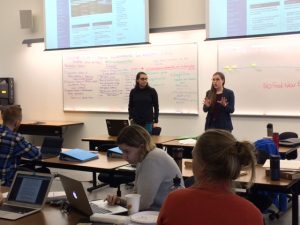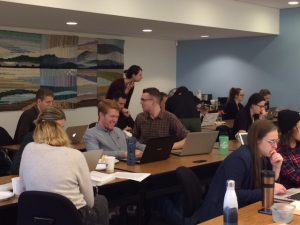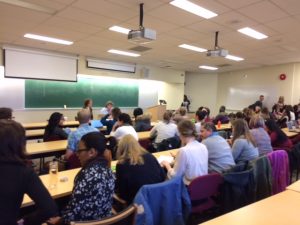Welcome to the second installment of Marginalia. Once again, the idea behind the feature is to provide an overview of the circulation desk as well as to offer updates on library hours, services and acquisitions. We’ll also be sure to include some useful tricks and tips along the way. As always, our intention is to keep it light, but relevant. So with that in mind, let’s take a quick look at how the law library might function in the far distant future.
In the Year 2525 …
Head Librarian Herbert Evans watched closely as Professor George Zager manipulated the holographic knobs and levers on their brand new ACME Temporal Retrieval Unit.
Once the proper coordinates appeared on the time machine’s search screen, Zager set the sequential oscillation generator to reverse and engaged the device. The machine responded with a short burst of electronic static and proceeded to drop an out-dated Wells Drive into the oversized delivery tray.
After determining the obsolete digital storage drive was still operational, Zager carefully slipped the device into the proper receptacle and patiently waited for it to load.
The screen flickered twice and finally settled on a document named ‘Marginalia: Dispatches from the Diana M. Priestly Circulation Desk’. Herbert Evans smiled, double-tapped the enhancement icon and began to read what appeared to be an informational document concerning recent technological changes and exam hours from late November 2018.
Dear Students,
Extended exam hours start on December 1st and end on the 20th. During that period the library will be open regular hours from Monday to Thursday (8AM to 10PM). On Friday the 7th and again on the 14th we will close at 8PM rather than 6PM. Saturdays and Sundays see us staying open until 10PM instead of 5:30PM.
The renovations are finished in the computer lab and the first two rows are now available for lap top users.
Additionally, the flatbed scanner has been upgraded and relocated to a more accessible location directly across from Study Room 163 on the Main Floor.
Remember, if you have any questions please feel free to drop by and ask us at the Circulation Desk. You can also call 250-721-8565 or email us at lawlib@uvic.ca.
By the way, did you know you can book a study room up to seven days in advance of when you need it?
Best of luck in your exams.
Zager and Evans chuckled at the antiquated technology their predecessors employed and decided it might be fun to go back even further in time. Herbert thought about it for a moment and suggested the 1950’s. George quickly agreed, reconfigured the Temporal Retrieval Unit, and activated the device. After a cacophonous series of clicks and clanks the machine smartly dropped a familiar looking object into the tray.
Zager looked at it, shrugged and passed it over to Herbert. Evans skimmed through the battered paperback book and soon found a title page indicating that it was an anthology of science fiction. He then handed it back to the Professor who opened it to a short story called ‘In the Year 2525’. He suddenly gasped in surprise, looked over at his colleague and read the first line to him: “Head Librarian Herbert Evans watched closely as Professor George Zager began manipulating the holographic knobs and levers on their brand new ACME Temporal Retrieval Unit”.
Photo & Prose: david eugene everard © 2018







